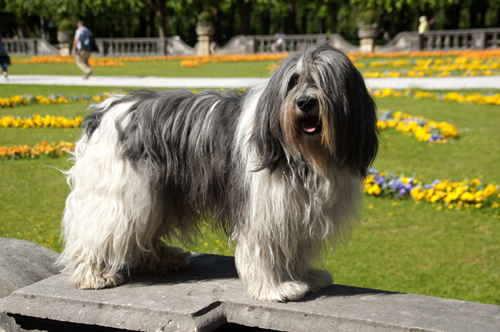| |
If you have
been asked to describe a dominant Pon, you might use the
terms, "aggressive and assertive". Unfortunately this is a
very common misperception. A dominant Pon tends to be very
cool, calm and confident in just about every situation. This
is why they are in fact, 'leaders'. Those Pons who fight and
bicker among themselves are far too preoccupied with their
own petty power struggles and anxieties, to be able to lead
anybody anywhere. Over the years the word 'dominant' has
taken on a negative image and is quite often used to
describe Pons who lack sufficient training, are under
socialized (therefore under confident), or extremely
fearful, perhaps from being mishandled by owners. Some are
aggressive and fearful because of medical conditions (eye
and thyroid, allergy,etc. issues) that have gone
undiagnosed.
During my years in Pons, I
have heard countless stories from owners who have followed a
"dominance avoidance schedule" after receiving advice from
trainers and handlers, only to become very disappointed when
noticing such advice was flawed. Some of the advice included
the following:
1. Don't allow your dog to
eat its meal until you (the top dog) have eaten first.
2. Don't allow your dog to leave the house (den) before you
(top dog) have passed through the doorway first.
3. Don't allow your dog to climb onto the sofa or bed.
4. Don't allow your dog to climb your stairs, or to stare at
you from the top of the staircase.
5. Don't allow your dog to look into your eyes.
Individual breed behavior needs to be
considered when deciding if a particular dog is dominant or
merely has breed characteristics. Sheepdogs follow a herding
behavior pattern when dealing with both humans and animals.
This behavior pattern always needs to be taken into account,
regardless of circumstances. Further, I
consider myself among those who believe that dogs are
sentient beings, capable of making decisions, reviewing
situations and learning for themselves. So bearing all this
in mind, if you happen to hear someone repeating rigid rules
on popular canine television shows, or read about them in
doggy magazines, their opinions may be far from being
entirely valid. Unfortunately many television networks and
popular publications, do not check out the qualifications of
their contributors and many of these "behaviorists" are in
fact self proclaimed experts, nurses, and dog lovers who are
merely regurgitating what they have read in popular dog
psychology books, most of which have been written by people
who are themselves passing along theories they have not
scientifically documented. Owners need to carefully check
the references of those who offer advice and try and
determine credibility of theories they present. Being a good
owner means thinking for one's self in all situations and
taking nothing for granted.
Most Pons need a "job" and
when allowed to participate in agility, conformation,
therapy and other activities, turn their attention to these
tasks and are more relaxed at home with their human
families. These Pons have discovered how to be happy with
their humans as well as being happy with their given tasks.
Was this happiness achieved by humans asserting "pack
leadership" or "alpha status" over the Pon's behavior ? Of
course not ! The family Pon has had his life changed by
offering him his genetically engineered job.
In summary, consider your
Pon's genetic potential when trying to determine if your Pon
is dominant or in fact, simply trying to fulfill his
genetic role in life. A contented, well adjusted Pon is a
busy Pon. |

